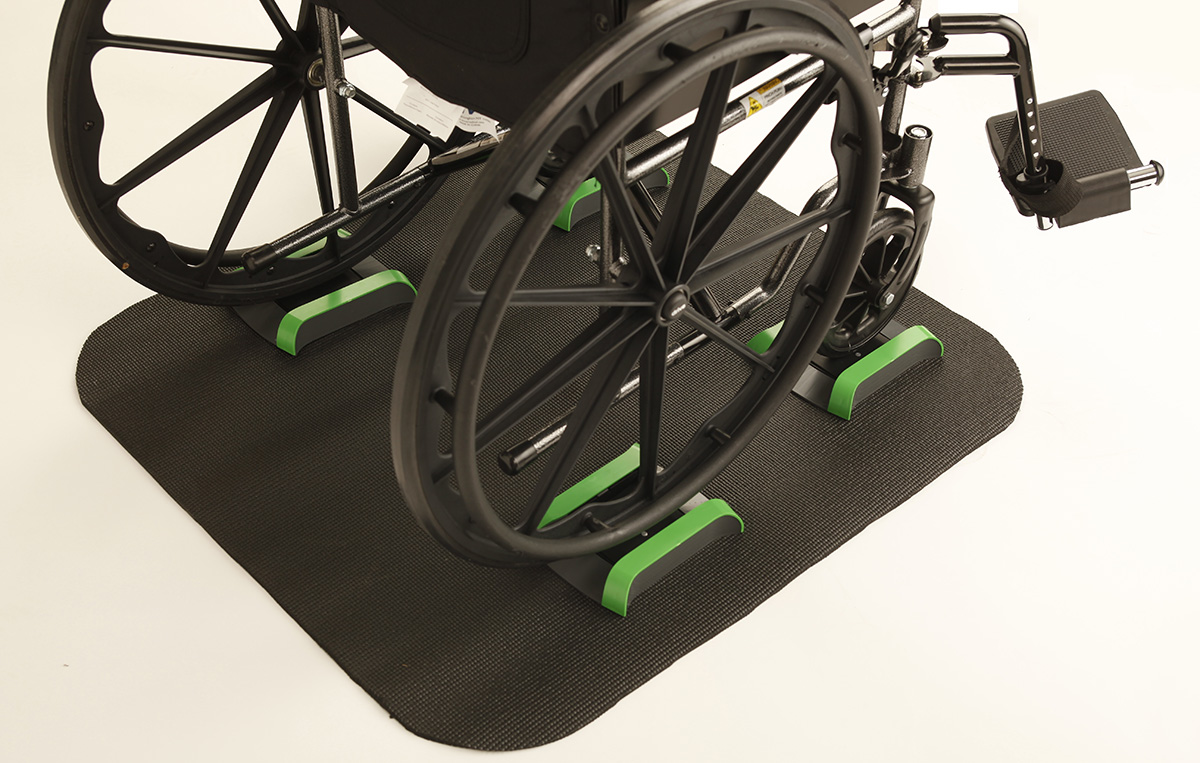Lilypad Scales Help Wheelchair Users Weigh Themselves

Photo provided
If you want to know how much you weigh, you step on a scale. But for wheelchair users, the process isn’t that easy.
Amos Meeks and Molly Farison launched Lilypad Scales to simplify that experience. The idea took shape after the former Olin College classmates spoke with several patients at Boston’s Spaulding Rehabilitation Hospital.
“One told a story of how he wanted to lose weight,” Meeks says. “He signed up for Weight Watchers to use a scale.” When he arrived to a meeting, however, the wheelchair scales he had heard about weren’t available. “He asked, ‘How am I supposed to lose weight or use Weight Watchers without a scale?’ We glommed on to that. We asked a lot of users…it was universally a problem.”
Meeks and Farison were in a course at Olin called “User-Oriented Collaborative Design,” where they were granted the opportunity to work with wheelchair users to understand their needs and values. Over the last two and a half years, they have been developing their initial product—the first iteration a thin platform scale that still wasn’t thin enough, but was overly expensive.
After showing users the prototype, one suggested the pair flip the scale to include a panel for each wheel. Four pads, each their own mini scale, are now attached to a mat roughly half an inch high that manual wheelchair users are able to roll on to. The pads communicate wirelessly with a smartphone, which adds up the individual weight of each pad to determine the user’s total weight.
Meeks and Farison used Olin’s Machine Shop to 3D print parts “relatively quickly.” The process allowed them to cost-effectively test whether a part was durable and garnered a reliable reading. Several employees of Waltham software company Autodesk, which is where the team is currently based out of, also helped walk the pair through the process of injection molding.
With an entirely 3D-printed, foldable, functional scale, the startup completed a beta test earlier this year with 40 paying customers, ranging from organizations to individuals who wanted a Lilypad Scale for home use. Throughout the process, they learned which parts of the instruction manual weren’t prominent enough, and that the scale worked better with some smartphones—particularly iPhones and higher-end Androids—than others.
“All the changes were fairly minor,” Meeks says. “We were able to fix a couple bugs and make a few things a little more obvious. We’re trying to better set people’s expectations.”
Those expectations, however, are fairly high. The startup has won $20,000 from Babson College’s B.E.T.A. Challenge, another $20,000 from student-run investment firm Rough Draft Ventures, and received mentoring from Dave Estrada, the former executive director of the National Spinal Cord Injury Association’s Greater Boston Chapter.
“Our ultimate goal from the start [was to solve] this huge, unmet need among wheelchair users,” Meeks says. “If you go into the doctor for an annual check-up, one of the things they’ll do is weigh you. That’s just not true for wheelchair users. We want anyone to be able to weigh themselves.”
The team will make that goal a reality beginning July 7, when Lilypad Scales launches for sale. The cost of the seven-pound scale rings in at $628—a price they want to bring down, although it’s still generally cheaper than the competition. Over the summer, they will also be figuring out how to make Lilypad Scales accessible for power wheelchairs.
“This is something we want people to really know about and talk about,” Farison says. “What we want is that when someone is trying to manage their weight, the first thing they think about is Lilypad.”

Amos Meeks, Molly Farison, and Dave Estrada. / Photo Provided


